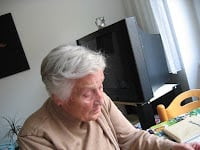Caring for dementia can cause caregiver burnout, endangering both patient & caregiver. Learn 8 ways to prevent it and better care for yourself. Get a free NIH Caregiver Handbook (104 pages).
Taking care of yourself is one of the most important things you can do as a caregiver. This could mean asking family members or friends to help out, doing things you enjoy, using adult day care services, or getting help from a local home health care agency. Taking these actions can bring you some relief. It also may help keep you from getting ill or depressed.
Caregiving Info
FREE BOOKLETS (NIA):
- Caring for a Person with Alzheimer’s (Your Easy-to-Use Guide)
- Long-Distance Caregiving (Twenty Questions and Answers)
CARE BOOKS – AMAZON:
8 Ways You Can Take Care of Yourself
- Ask for help when you need it.
- Join a caregivers’ support group.
- Take breaks each day.
- Spend time with friends.
- Keep up with your hobbies and interests.
- Eat healthy foods.
- Get exercise as often as you can.
- See your doctor on a regular basis.
Keep your health, legal, and financial information up-to-date.
It’s Okay to Ask for Help
Many caregivers find it hard to ask for help. They feel like they should do everything themselves, or that no one will help even if they ask.
They may think it’s not right to leave the person with Alzheimer’s disease with someone else. Maybe they cannot afford to pay someone to watch the person for an hour or two.
It’s okay to ask for help from family and friends. You don’t have to do everything yourself. If you have trouble asking for help, try these tips:
- Ask people to help out in specific ways like making a meal, visiting the person with Alzheimer’s, or taking the person out for a short time.
- Join a support group to share advice and understanding with other caregivers. These groups meet in person or online. Ask the person’s doctor, check online, or look in the phone book for a local Alzheimer’s organization.
Ask “Uncle Sam”: Most U.S. Government Services Are Free
- Call for help from home health care or adult day care services when you need it.
To find providers in your area, contact Eldercare Locator at 1-800-677-1116 or
www.eldercare.gov. - Use national and local resources to
find out how to pay for some of this
help. To learn more about government
benefits, see www.nia.nih.gov/alzheimers/publication/when-youneed-help/getting-help-caregiving. - If you are a veteran or caring for one,
the U.S. Department of Veterans Affairs
(VA) might be of help to you. To learn
more, visit the VA caregivers’ website at
www.caregiver.va.gov or call toll-free at
1-855-260-3274.
Your Emotional Health
You may be busy caring for the person with Alzheimer’s disease and don’t take
time to think about your emotional health. But, you need to. Caring for a person with
Alzheimer’s takes a lot of time and effort. Sometimes, you may feel discouraged, sad,
lonely, frustrated, confused, or angry. These feelings are normal.
Here are some things you can say to yourself that might help you feel better:
- I’m doing the best I can.
- What I’m doing would be hard for anyone.
- I’m not perfect, but that’s okay.
- I can’t control some things that happen.
- Sometimes, I just need to do what works for right now.
- Even when I do everything I can think of, the person with Alzheimer’s disease will still
have problem behaviors because of the illness, not because of what I do. - I will enjoy the moments when we can be together in peace.
- I will try to get help from a counselor if caregiving becomes too much for me.
Meeting Your Spiritual Needs
As the caregiver of a person with Alzheimer’s, you may need more spiritual resources
than others do. Meeting your spiritual needs can help you cope better as a caregiver and
find a sense of balance and peace. Some people like to be involved with others as part
of a faith community, such as a church, temple, or mosque. For others, simply having a
sense that larger forces are at work in the world helps meet their spiritual needs.
The Alzheimer’s Disease Education and Referral (ADEAR) Center
MORE INFORMATION:
ADEAR
is a service of the National Institute on Aging,
part of the National Institutes of Health. The Center offers information and publications for families, caregivers,
and professionals about Alzheimer’s disease and age-related cognitive changes.
National Institutes of Health…Turning Discovery into Health





My husband has ALZ. What is it that makes people who spent 20 minutes with him 8 weeks ago think that they know him and our life together?
OMG Toni I am so with you on this! I also take care of my husband and some people tell me "are you sure he has Alzheimer's?
I am my mom's caregiver and get the same reaction!
Hubby has ALZ. Sometimes I feel that we both have a contagious disease.
You are so right. When we are out people will say how good he looks and how well he is doing. That's the end of it. I sometimes get the feeling no one wants to be around him because he asks so many questions. I even had a friend tell me that I am in "denial" and should be thinking about putting him in a nursing home! He is a long time away from a home.
I spend hours every day with people who have Alz. I wish doctors were more empathetic and didn't think they knew what the family goes through. When you have seen one case of Alz you have seen ONE case of Alz.
yes, all of the above. hubby's "nurse" daughter doesn't even call. Thinks i'm over reacting. used to ask, "when can you drive again dad". REALLY? I DO THINK many think "it's CONTAGIOUS" but maybe they are just fearful IT could be THEM. and the doctors. YE GADS. FOUR, count em. FOUR VA medical appts. one blood draw, one primary doc, one geriatrics, one MORE "mental health" for buspar. ALL could be done by ONE doctor and ONE visit. nope. put us thru hell. WE are "the DOCTORS". YES, I am getting very good at saying. NOoooooo. NO TO zombie em out meds. NO to things they THINK will make it "easier" but in fact will make the progression of the disease quicken. DOCTORS do NOT know it all. just say NO when YOU know better. and yes. if one more person tells me. YOU KNOW you WILL HAVE TO put him "in the home". well maybe, but NOT today. yes, we are all in this together and often, on our own. sigh.
How can I get a free copy of the book caregiving info
In the orange box above or in the orange box in the right-hand column, click on the link that says, "Caring for a Person with Alzheimer's".
It is under the title, "FREE HANDBOOK".
This is a great book. I saw it one day in a medical office, and wanted to take it home with me.
The link for the free book doesn't do anything when I click on it ��.
Try it now, it works.
I clicked on the oranges box and still couldn't see how to receive the free book
For the free book, click on the following link:
Caring for a Person with Alzheimer's